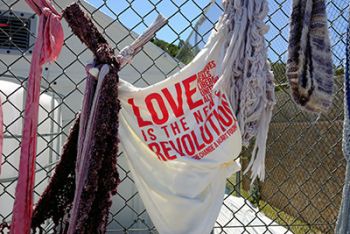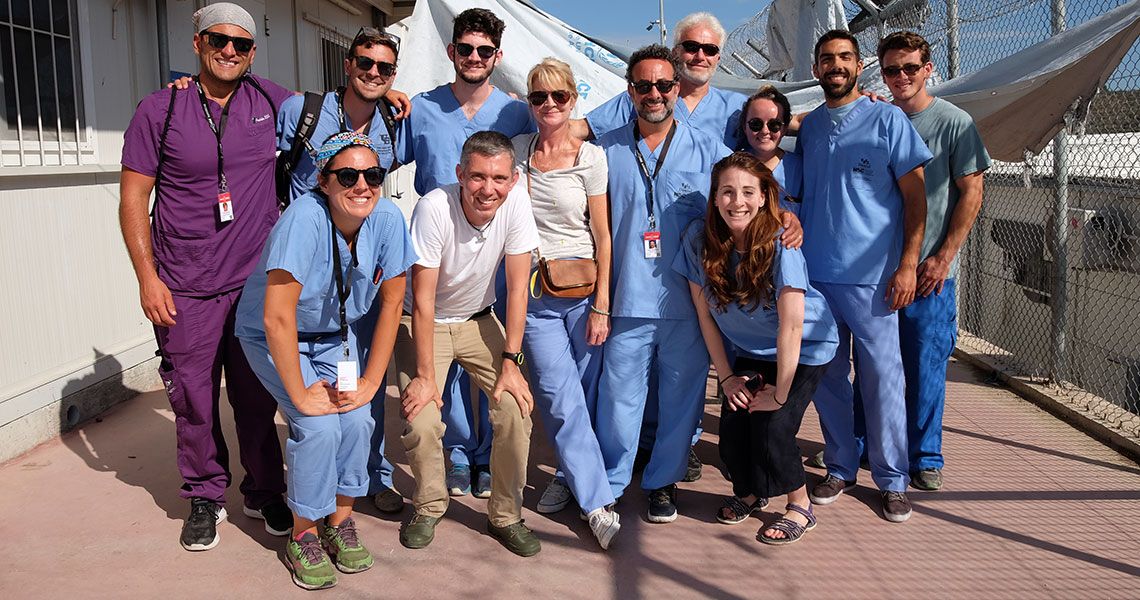As displaced refugees from Middle Eastern nations and parts of Africa make their way through the hills of Turkey and across the Aegean Sea to Greece, their needs – food, shelter, clothing – are basic but essential. Equally important to their survival is psychological well-being.
“Mental health is an important part of all health,” explained Allen Dyer, MD, PhD, professor of psychiatry and behavioral sciences at the George Washington University (GW) School of Medicine and Health Sciences (SMHS). “Depression is one of the largest unmet health needs worldwide. In the case of the refugee populations, depression and acute stress reactions and chronic stress reactions, like PTSD, are a very significant part of what people are facing.”

Refugees, however, are not the only ones in need of mental health assistance; humanitarian workers likewise require support. According to SMHS research fellow Feras Alkharboush, MBBS, they feel compelled to give as much of themselves as they can, leaving little energy for their own health.
“You want to help, but the days keep repeating themselves,” Alkharboush said. “With time, you start to burn out and you lose the sense of meaning that comes out of it. So, you can generalize this, to one degree or another, with most of the humanitarian workers in Greece.”
To help, in July 2017, Dyer and Alkharboush, along with other SMHS faculty, medical students, and research fellows, traveled to Athens and the Greek island Lesvos, where they provided resilience training to humanitarian workers. The trip, Dyer said, was a follow-up to a 2016 trip organized by the United States Embassy in Athens and non-governmental organization METAdrasi; this year’s trip was also conducted with Médecins Sans Frontières, also known as Doctors Without Borders.
“One of the important things for the students – and I must say, our students performed wonderfully in these situations – is for them to understand health in a global context and then be able to address serious problems and empathically be aware of what people are facing,” Dyer said. “At the same time, [they need to] be able to take care of themselves and recognize the emotional impact that dealing with these very difficult situations has on them.”
With techniques from the GW Resilience Workshop, humanitarian workers learned about coping mechanisms, and SMHS volunteers provided compassionate care. Fourth-year MD student Courtney Shay, for example, spent time with a dual refugee-humanitarian worker, one of many who balance dealing with others’ trauma along with their own. Shay chronicled her experience in an essay; an excerpt, in which she describes an interaction she had with a refugee while in Greece, appears below:
“No one cares about us,” you tell me. A black hijab drapes your face and shoulders, framing a set of dark eyes that pierce straight into mine. I struggle to look back into those eyes. You are angry, and you want your voice to be heard.
You tell me about your journey to Moria, the refugee camp that you have called your “home” for the past 11 months. The same camp where we now stand face-to-face in front of the makeshift dental clinic where you assist the medical teams by translating Farsi. It is here where you tell me about the initial hope you felt when you first stepped foot on the island of Lesvos, imagining that you had reached a safe haven where you could begin a new life free from violence. You tell me of your goals to continue your journey onward to Germany, where you would settle down and pursue higher education — a master’s degree in education — so that you can continue teaching English as you once had.
You tell me about your old life in Afghanistan. This was the life you had before the Taliban threatened the safety of everyone you knew, and you were forced to leave the country. The life you lived with your mother and father and uncles and cousins. You tell me about your job as an English teacher in the local schools, about your passion for creative writing and about your love for cooking kabuli pulao, a traditional Afghan basmati rice dish. This was before you came to Moria to eat the same plate of eggs and rice every day for breakfast, lunch and dinner, until the very thought of the grain began to churn your stomach.
You tell me about your family, about your mother who came with you, who was also able to afford the $8,000 fee to the man who would illegally smuggle both you and her across the Aegan Sea. And you tell me about your father, who wasn’t.
You once had so much hope and excitement for the idea of beginning a new life, despite the fear and sadness of leaving your old life. But you haven’t been able to start a new life. In fact, you haven’t even been allowed to continue your old one. You are not allowed to hold a job or pursue education, because you do not have a Social Security number and therefore cannot pay taxes. You cannot leave the island, as paradisiacal as it appears, because you do not have the proper documentation and legal status to be in this country. Although you are permitted to leave the camp and traverse the island, you have nowhere to go and no money left to spend.
And you have not escaped the violence either. On July 10, riots in Moria ravished the camps, while on July 20, a peaceful protest turned violent when police officials began teargassing victims. It is not only the cops who leave refugees broken and bleeding. Self-harm and suicide has increased 600 percent since the advent of the EU-Turkey deal signed in March 2016, mandating the deportation of illegal refugees back to Turkey where they are likely to face imprisonment and brutality. Doctors from Médecins Sans Frontières (MSF), who run mental health clinics for refugees on Lesvos, reported that 80 percent of refugees assessed in Moria suffer from severe mental health issues.
I am here with students from the University of Buffalo, each of us eager to serve and eager to learn, and eager to practice our craft on a willing patient population. But this patient population is only “willing” because they have no other choice. They are not all impoverished — or at least, they weren’t before they came to Moria. Our waiting room (a metal bench protected from the blistering heat by a plastic tarp) is filled with people of all ages from Syria, Afghanistan, Somalia, the Democratic Republic of Congo, and they are speaking French, English, Arabic, and Farsi. Some are poor — they have never been to a dentist, and many have multiple cavities and rotted teeth that need to be extracted. But many patients are from wealthier backgrounds where they experienced regular dental care. They come to us for revisions of root canals, and one even presents us with custom-made ceramic dental crowns he would like for us to install. But we were unable to offer these services in the confines of a camp with limited resources and electricity. Again, their wishes and needs are not fulfilled, not for lack of money or social status, but for lack of legal status.
You ask me about my life in the United States. You want to know what it is like to go to medical school, what it is I do every day, and what kind of people I help. I tell you about the long hours, the sleepless nights filled with anxiety, the overwhelming workload I am forced to balance on a day-to-day basis. Suddenly, I feel guilty. How do I reconcile the fact that the same routines and responsibilities that imprison me in my own life are the very same routines and responsibilities that would set you free?
“No one cares about us,” you repeat. Now I understand why you say this. I want to tell you that I care about you, but this is futile. Reassuring words are no match for the anger and sadness that have been building inside your heart and your mind for the past 11 months. I am still struggling to look you in the eye, but I force myself to do so because you deserve dignity and respect, and these are two of the very few things that I am able to give to you. I want to tell you how important your work is here, and how much we rely on you to provide proper medical care to the people. I don’t know what your future holds, and I have no hope to offer you, but I do know that right now, your job is important. I want you to know that you are important, and that your life matters.
While the SMHS psychiatry volunteers’ time was limited in Greece, Dyer, Shay, and Alkharboush, who acted as a cultural interpreter along with fourth-year MD student Sagah Ahmed, felt they had made an impact on both refugees and humanitarian workers. Whether it was acting as a sounding board for listening, providing therapeutic techniques, or properly translating thoughts and feelings from one language to another, they departed the country having made a difference – and departed feeling a mark of the experience themselves.
“Since I returned … already I view my patients in a different light,” Shay said. “I recognize that beyond the protective curtain on the provider-patient relationship, there is a vulnerable person who leads a life outside of the hospital. Often times it is a situation outside of a person’s control that makes them vulnerable, and these moments do not define a person’s life – only a small part of it that I am bearing witness to. I am reminded to look at my patients as a whole and recognize that I am their advocate, as I am the one they are turning to in these moments.”



